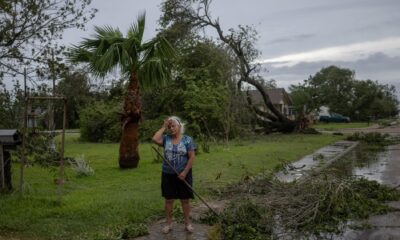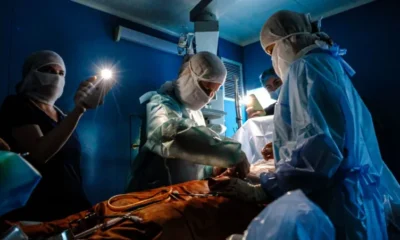It has been nearly one year since 37-year-old Ashley Comrie from Toronto fell ill with COVID-19 but her recovery is far from over.
“I tested as having a brain injury. I had to relearn how to talk again. I had to relearn how to walk properly again, cut with a knife and fork, just all of these things that I could do before that I just can’t do now,” she said.
Comrie has also had four medical procedures and deals with “COVID flares.”
“I’ve had a lot of kidney issues … None of this was something that was happening before COVID and so no one can really explain what’s going on,” she said, adding, “I still get these little COVID flares where my heart rate goes up really high … and then I get a fever and I’m just out for three or four days.”
Read more:
Ontario married teachers, parents of 7, share story about battling COVID-19
Comrie has two autoimmune conditions that, she explained, were under control with immunosuppressants prior to the pandemic.
“One of the hard things I think has been hearing people’s say things like, ‘Oh, well, this person had a prior condition,’ and I think that takes away the humanity of the people who are actually suffering,” she said. “I was working full time. I was a contributing member of society. I had a family and friends who loved me. So just because I had a preexisting condition didn’t necessarily mean that, you know, I deserved to get it or that anyone deserves to get it.”
Read more:
‘I’ll live to see another day’: COVID-19 survivor describes effects of virus 8 months later
Comrie is a social worker and had been working full-time from home during the first wave.
Her husband went to get groceries at their local west-end Loblaws, which shut down soon after due to a COVID-19 outbreak.
Feeling unwell, the couple went for testing and Comrie was rushed to hospital from the assessment centre.
“I think I was so out of breath and so kind of out of it and not really understanding what was going on that they actually took me to the hospital from the testing center and then I got out two months later,” she recalled.
Being alone without her husband Kirk was difficult for Comrie, who would end up spending a total of 60 days in hospital and rehab.
Read more:
‘I’m scared’: Toronto COVID-19 survivor who defied odds updates recovery, expresses fear
“I had no idea I was going to get that sick that fast and I don’t think you’re ever prepared to spend 60 days isolated from family and friends and end up in the ICU when you’re 37,” she said.
It was still early in the pandemic and Comrie recalled doctors were unsure of how to treat the mystery illness.
“They had just started hearing about people being proned in Italy at that point and so that’s what they ended up trying … for 12 hours a day, I would lie on my stomach with all these machines coming out of me, just kind of willing myself to be able to breathe on my own,” she said.
She would listen to Dolly Parton music and envision her husband holding her hand during the many dark hours.
“My biggest fear was dying alone … My biggest fear was not seeing my family again and dying from this virus when I hadn’t even left my house,” she said.
Read more:
‘This is my second chance’: COVID-19 survivor who defied odds recovering in rehab centre
Months since she left the rehabilitation facility, Comrie continues her recovery, noting COVID-19 has changed her.
“When I came out of hospital, I expected that I would just go back to my life the way it was … that is a big misconception with the ninety nine percent survival rate that you just go back to your life … There are thousands of people like me who are still trying to navigate the ramifications of this virus day to day,” she said.
Despite the long and difficult journey, the hardest part right now for Comrie is seeing how badly the virus is affecting everyone.
“A year ago, I was the anomaly, right? I was the young person that got it … and now we’re seeing ICUs fill up with people who are my age and younger and I just can’t tell you how much it breaks my heart to think of people having to go through the same thing that I’ve gone through when we really didn’t have to get to this point,” she said.
Read more:
‘It was a shocker’: Front-line health-care worker’s family hit by COVID-19
Comrie pointed to “mixed messaging” as the root of the problem in Ontario right now.
“I’m just really frustrated because I think the way that it has been handled in the last year has really just served to make the arguments more divisive. I think the more inconsistent the messaging is around the stay-at-home orders or what can be open and what can’t, the more people end up questioning the science,” she said.
“If we don’t start looking at the people who are actually getting sick, the people who don’t have access to sick days in order to get the vaccine or if they are sick, to be able to stay home, if we don’t start looking at the way we’re rolling out vaccine distribution … I think we’re going to keep going back and forth between shut down and open and lockdown and gray zone,” she said.
Must See
-




Entertainment
/ 3 days agoFaveSzn’s Revelation: Dating Choirmaster at 10 and Sexual Curiosity
Nigerian singer, Chidozie Ugochinyere, popularly known as FaveSzn, has revealed that she once dated...
By Flying Eze -






Europe
/ 3 days agoWhy Hungarian Prime Minister Orban visited
Two months later, the leaders of China and Hungary met again. Hungarian Prime Minister...
By Flying Eze -






News
/ 3 days agoThree dead and millions without power as Tropical Storm Beryl hits Texas
Man, 53, and woman, 74, killed by fallen trees and third person drowns amid...
By Flying Eze



